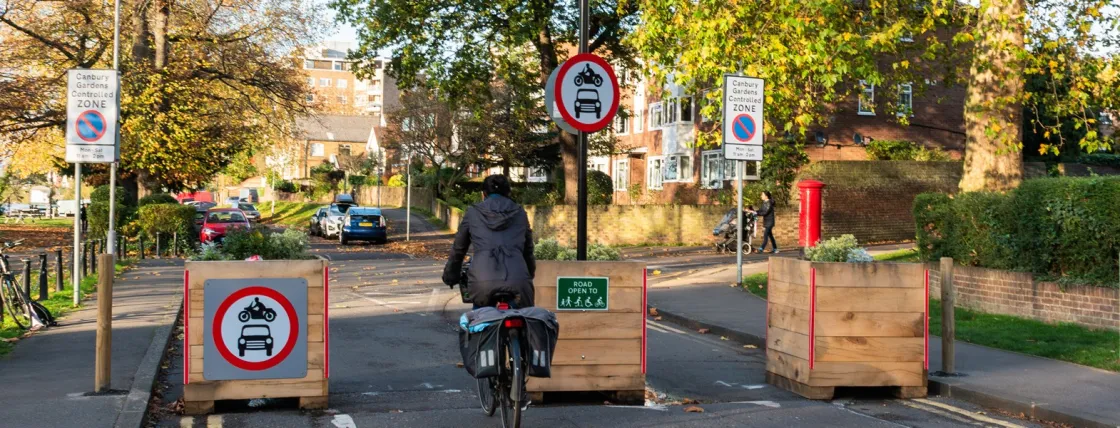Healthy low-carbon Transport Hub established to explore the health benefits of net zero

The Healthy Low-carbon Transport Hub (HLTH) has been established to lead research into the potential to maximise the health benefits of low-carbon transport. Accelerated transport decarbonisation is essential if the UK is to meet statutory greenhouse gas (CO2e) emissions targets. Historically, CO2e emissions reduction measures have not systemically considered physical and mental health impacts, or inequalities in their distribution. For example, in the UK replacing petrol with diesel cars led to poorer air quality and health outcomes without addressing increasing levels of obesity and physical inactivity. New research aims to avoid these mistakes in future.
The potential health benefits of some forms of low-carbon transport, such as increased physical activity and cleaner air, are well documented. Mental health and wellbeing benefits are also possible but less clearly evidenced; and some forms of low-carbon travel are being promoted without full consideration of health implications. For example, increased particulate emissions from tyres and brakes from increased weight and acceleration/deceleration of electric cars potentially lead to more severe respiratory disease and greater likelihood and more severe consequences of collisions with vulnerable road users.
Health impacts and inequalities in their distribution might also arise from other underlying trends and policy measures which reduce the need to travel, for example through increased remote working. Attempts by transport(?) planners, engineers, public health experts and policy makers to promote health-beneficial forms of transport have met with mixed success; for example, cycle networks and Low Traffic Neighbourhoods (LTNs) have been blocked or resisted.
The new Hub will identify barriers, incentives and accelerants to implementing healthy low-carbon transport schemes and propose and evaluate new solutions towards maximising health co-benefits and reducing health inequalities associated with low-carbon transport interventions.
HLTH involves public health professionals, public engagement specialists, engineers, planners, geographers, social scientists, and transport and health economists from the UKCRIC member Universities of Southampton, Birmingham, Leeds, and University College London. Pilot interventions will be explored using the UKCRIC-UCL Person-Environment-Activity Research Laboratory (PEARL) and in the field, in collaboration with local authorities. The unique multiscale and multidisciplinary science carried out at PEARL will enable the hub to assess the effectiveness of different options, and to display them to stakeholders so that they understand the implications of their infrastructure decisions on the wellbeing of people.
The HLTH is one of seven transdisciplinary research hubs based at institutions across the UK to receive investment from The National Institute for Health and Care Research (NIHR) and UK Research and Innovation (UKRI).
Health Minister Baroness Gillian Merron said:
"This £42 million investment into net zero research hubs will bring together world-class researchers to boost public health and tackle inequalities. Through our Plan for Change, we will make the UK a clean energy superpower while improving health outcomes for everyone.”
William Powrie, Professor of Geotechnical Engineering, University of Southampton, and HLTH Project Lead added:
“We are delighted with the funding from the UKRI and NIHR that will enable us to establish the Healthy Low-carbon Transport Hub. Our interdisciplinary research programme will deliver a multiple-outcome approach to the planning, implementation and assessment of low-carbon transport schemes, with full integration of health co-benefits and equity considerations. This is long overdue, and will bring step-change improvements in both public health and progress towards a low-carbon future.”
Professor Chris Rogers, Director of the Centre for Future Infrastructure and Cities, University of Birmingham, and HLTH Project Co-Lead, said:
“This opportunity to advance UKCRIC’s pioneering systemic and transdisciplinary approaches to the engineering of our transport infrastructures, synergistically with our other infrastructure and urban systems that support civilised life, is as exciting as it is valuable. Translating UKCRIC’s generic Theory of Change into a bespoke, evidence-based theory and practice of change for healthy, low-carbon transport, incorporating business models that move the conversation from cost to value and surface comprehensively social and environmental value, provides an opportunity for profound innovation.”
Nisreen Alwan, Professor of Public Health at the University of Southampton, and Project Co-Lead, said:
This is an exciting opportunity to fully integrate considerations around narrowing the population health inequalities gap into transport design, implementation and evaluation. I am very much looking forward to work in a true transdisciplinary fashion with colleagues and partners from across the UK to better realise the health benefits of low carbon transport.
Professor Nick Tyler, Director of the Centre for Transport Studies and PEARL at UCL, and Project Co-Lead, said:
At PEARL we ask fundamental research questions about how human brains interact with physical and sensory infrastructure so that we can understand how to ensure that infrastructure is fit for people now and in the future. This transdisciplinary approach helps to build solutions that are fit for purpose for future generations, enabling people and the environment to thrive in a healthy, equitable way. In collaboration with our partners in the Healthy Low-carbon Transport Hub we will co-cultivate, co-design and test potential solutions at scale through controlled-environment experiments with people.
Professor Phill Wheat, Deputy Director, Institute for Transport Studies, University of Leeds, and Project Co-Lead, said:
“Currently there is lack of evidence to assess, quantify and value the impact on our health, good or bad, resulting from transport decarbonisation measures. Drawing on a number of case studies and with input from the public, policy and practitioner audiences, a key focus will be to evaluate existing interventions and make recommendations for the design of future transport decarbonisation schemes”.
This work is supported by UKRI Building a Green Future strategic theme, NIHR, EPSRC, MRC and NERC.
Key deliverables of HLTH are:
- a comprehensive, system-of-systems-level understanding of the potential health co-benefits/disbenefits of low-carbon transport and how co-benefits can be realised rapidly and at-scale via novel business models and governance frameworks;
- transdisciplinary, multi-benefit, scheme design, appraisal and evaluation frameworks/metrics identifying the full range of potential co-benefits/disbenefits (health, equity, social, environmental, economic), de-risking decision-making and improving the likelihood of funding and implementing successful schemes;
- propose assessment and governance changes that, combined with implementation guidelines, will provide clear pathways to rapid success;
- understanding how to design and accelerate implementation of low-carbon transport schemes to ensure uptake and success; hence
- improved physical and mental health/wellbeing throughout the UK's population, reduced health inequalities, and the achievement of net-zero CO2e emissions from transport while delivering greatest social, environmental and economic value.
Project partners include: Active Travel England, Birmingham City Council, Chartered Institute of Highways and Transportation, Department for Transport, Go South Coast, Local Council Roads Innovation Group, London Borough of Hackney, Portsmouth City Council, Southampton City Council, Sustrans, and Transport for West Midlands.














